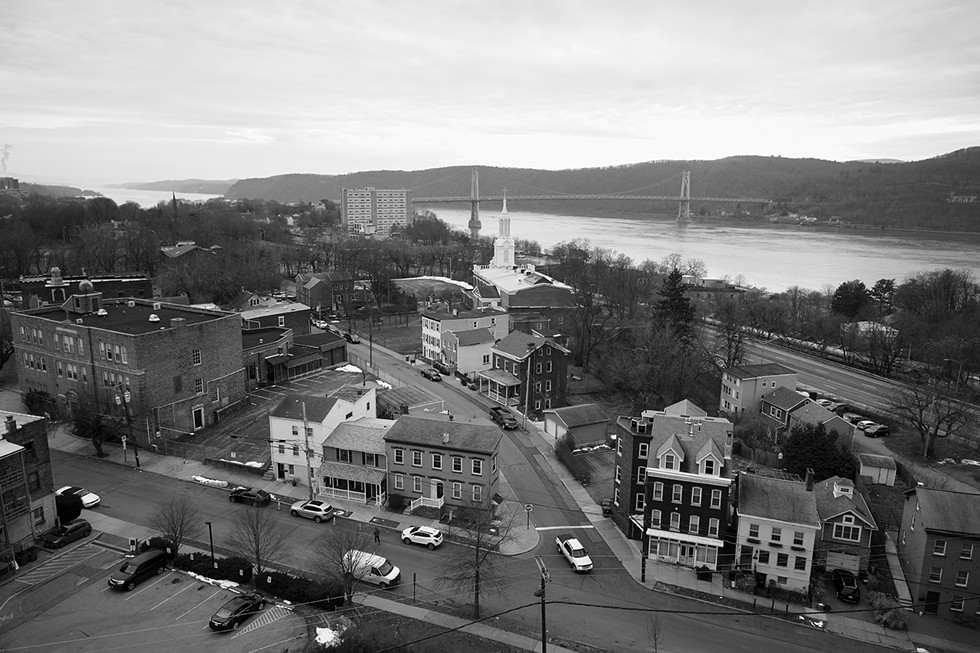Poughkeepsie has been a scene of political strife in recent years, with ongoing competing lawsuits between the Common Council and Mayor Rob Rolison exemplifying those tensions. But nothing better epitomizes the bitter divisiveness of the city’s political landscape than the past year’s friction between the police department’s Police Benevolent Association (PBA) and the Common Council. At the center of the conflict is a proposed civilian complaint review board and the police union’s labor contract.
The council first proposed a civilian review board last August, and postponed voting on the union contract for months due to legal and financial concerns. In response, the PBA waged an aggressive public-harassment campaign against council members who it says wanted to advance an anti-police and anti-public safety agenda in the wake of George Floyd’s death. The union targeted one group in particular, perceived by many as the council’s progressive wing: Councilmember At-Large Sarah Salem, Vice Chair Sarah Brannen, and freshman Councilmember Evan Menist.
“Once again this embarrassment of a council has shown their true colors. Specifically, Sarah Salem, Sarah Brannen and Evan Menist have shown what calculated and dishonest carpetbaggers they are,” begins a December 8 statement from the PBA responding to the council’s decision to postpone voting on the contract.
“It is of note that this goes beyond a difference in opinion or a different world view. We can disagree, but Salem, Brannen and Menist are hateful and vindictive.”
The council eventually approved the union’s contract on March 1. Folded into it is a provision to create a 12-month working group of city officials, council legislators, PBA members, police department command staff, and community members that will provide recommendations for the civilian review board’s structure and powers. The council may pass legislation for a review board at any time during that yearlong process.
“My job is to help raise the voices of historically oppressed, marginalized populations in our community to ensure that they feel like they’re able to participate in this system,” says Salem.
It wasn’t always like this between the PBA and council members. The killing of Floyd inspired activists across America who had been calling for police reform to push even harder, mainstreaming ideas, such as defunding the police, that had previously been viewed as fringe. In Minneapolis—the epicenter of last summer’s struggle for police accountability and abolition—council members unanimously voted to dismantle the city’s police department (though that pledge fell through). Most public officials nationwide chose a path of reformation over abolition. But the current revolution over policing has many police unions on the defense. Michael Sussman, an Orange County-based civil rights attorney who has litigated police accountability cases across the state, says Poughkeepsie is hardly unique in resisting reform from outside.
“This is a struggle that is playing itself out all over the country because of the way police agencies view themselves inherently,” he says.
The union’s media campaign has tempered in recent weeks, but its previous high-pressure tactics allude to the more insidious history of how American police unions push back against their political enemies.
21st-Century Policing
Poughkeepsie was no stranger to police reform before 2020. Over the years, its police department has initiated trainings and procedures recommended in President Obama’s 21st Century Task Force in Policing report—widely deemed the best blueprint for police reform—including implicit bias training, body-worn cameras, police-community engagement events, and procedural justice, an approach that focuses on building community trust.
City activist-residents kicked off last summer’s reform debates by reintroducing discussion on the Right to Know Act. The law, which was passed in July of 2020, requires city of Poughkeepsie police to identify themselves, state the reason for a stop, and provide a business card at the end of their encounters with the public. The criminal justice advocacy group End the New Jim Crow Action Network and the Hudson Valley chapter of the New York Civil Liberties Union had first broached the legislation to Police Chief Thomas Pape and the Common Council in 2017. Pape and the advocates negotiated a consensus: Allow the department to complete procedural justice and implicit bias training before revisiting the legislation.
Pape went on to change his mind twice about the law amid the department’s internal reforms during the following two years, though compromise eventually yielded unanimous “ayes” across the council. The length of that legislative process frustrated both activists and some council members.
“I could never understand why what seemed like such a simple act to help increase trust and transparency took so long,” says Salem. “One of the remarks [from the department] was, ‘Well, we’re already doing this.’ Why not just put it down on paper? Let’s make sure that it’ll be done long-standing.”
Other council members say the process, though drawn out, was a model for how police reform should happen in the city. “If you throw something in somebody’s face and shove it down their throat, they’re not going to be receptive to it and it’s not going to be effective,” says Councilmember Yvonne Flowers. “But if you at least have a dialogue, at least to feel like [the police department is] part of the process, then you can make your decision of which way you want to go with it.”
Ground Zero
All parties walked away from the Right to Know Act’s passage feeling their concerns were heard, at least. That hasn’t been the case for the civilian review board.
That legislative journey began when Councilmember Menist asked Poughkeepsie resident and Equitable Future CEO Brian Robinson to draft legislation for a civilian review board in June of 2020. Robinson previously wrote Senate Bill S8223, dubbed the Equitable NY Act, which would require employers to report workforce demographics and equity measurements—such as wages and promotions—to the New York State Division of Human Rights. The proposed civilian review board would train citizen volunteers to investigate all complaints against the Poughkeepsie Police Department.
At the time, Chief Pape said that he didn’t see the need for it, citing that the department only receives 10 complaints a year alleging rudeness or discourtesy. “I don’t really see a discipline issue here that we need to combat from a different angle,” he said during a special meeting of the Common Council.
But Menist believed otherwise. He’d launched his Common Council campaign amid fallout from the controversial 2019 arrests of two Black sisters, Jamelia Barnett and Julissa Dawkins. Barnett ran to Dawkins’s aid while she was under arrest, but another officer, John Williams, intercepted Barnett and threw her to the ground. After a nearly 200-hour internal investigation, the city concluded that Williams, who was involved in another police brutality incident 10 years prior, did not use excessive force. Menist declined to comment on the city’s conclusion, but he is critical of what he says was insufficient transparency throughout the investigation.
“I felt it necessary that, in the spirit of justice and healing, complaints against the officers be brought into the light and be conducted by a civilian oversight organization,” he says.
Brannen, a former investigator for the NYC Civilian Complaint Review Board, says the board would help engender trust among a constituency that is often afraid to file complaints against the police department. “I would predict that once it is in place, we will see more complaints,” she says. “That doesn’t mean that in every instance there’s been some kind of transgression. That’s the purpose of an investigation—to determine whether or not there’s merit.”
Menist forwarded the draft legislation on August 11 to the city’s Procedural Justice Committee for comment and recommended changes. That committee was formed in 2019 to help ameliorate community-police relations; last year, Mayor Rolison tasked it with providing police reform recommendations under Governor Andrew Cuomo’s Executive Order 203, which requires New York municipalities to “reform and reinvent” local policing. The group is made up of civilians, city officials, and police union leadership.
Less than two weeks later, the PBA launched its nearly seven-month campaign against reform-minded legislators by alleging that Councilmembers Salem and Menist had purposely left the organization out of the civilian review board legislative process.
“We have always had an open dialogue with City Council members. Unfortunately, now there are a few council members who have elected to push their political agendas as opposed to trying to have a positive relationship with our PBA, where we could collectively come up with solutions on how we can ensure public safety, transparency and trust within our community,” reads its August 21 statement.
Asked if forwarding the draft legislation to the city’s EO 203 committee was an unacceptable approach to dialogue with the union, detective Chris Libolt, the vice president of the PBA, says the union had preferred a more collaborative approach.
“Like many other interested parties, the PBA simply wanted a ‘seat at the table’ to make sure the concerns of our members were also considered in the formulation of a CRB,” he says.
Since last August, Menist says he has met with the union and Chief Pape on several occasions. Libolt did not provide specifics when asked to clarify the union’s grievances with the draft bill. But emails provided to The River through a Freedom of Information request show that Common Council and PBA members have discussed removing civilian review board members’ subpoena power, adding one to two current or retired Poughkeepsie police officers to the board, and barring civilians previously convicted of a felony from sitting on the Board, among other amendments.
Additional email exchanges show that Menist and the PBA have not met since at least December. Menist confirmed that he plans to meet with the PBA on April 8.
“When you’re [discussing] in person by word of mouth, it’s easy to misremember and have two people remember a conversation differently,” Menist says. “I just want to have it in writing.”
Debate persists on how the council and PBA should have approached their communication. But it is the union’s other political maneuvers that have alarmed and disappointed community members and city legislators.
“Anti-police Agendas”
The PBA maintained a seven-month social media campaign against pro-reform legislators for “capitalizing off of the public health crisis and turbulent times to push their anti-police agendas,” as it wrote in an August 20 statement. The legislators’ actions, the union wrote, were particularly egregious amid a surge in gun violence in the city.
The PBA’s anti-police portrayals of Salem centered on their arrest record, which they believe drives a vendetta against the department. (The union’s statements refer to Salem with she/her pronouns, though Salem is non-binary and uses they/them pronouns.) Poughkeepsie police arrested Salem in February of 2020 for allegedly driving while intoxicated. The Mid-Hudson News reported that Salem struck another vehicle, injuring the driver, who subsequently needed several surgeries.
Salem pleaded not guilty to charges related to the arrest, though proceedings were still underway in Poughkeepsie City Court at the time of the union’s August statement. Union leadership has called for Salem’s removal from office, while other union members only request that Salem recuse themself from police-related legislation.
“Due to the nature of [their] criminal case and the obvious ethical conflict, the PBA does not believe that Salem should have any involvement in police matters or be able to vote on any legislation until the criminal case is adjudicated,” reads the union’s August 20 release.
The PBA has also called for the city’s Ethics Board to limit Salem’s legislative powers. In response, Salem offers a quote from Bryan Stevenson, a public interest lawyer who represents wrongly convicted persons and those denied fair trials: “Each of us is more than the worst thing we’ve ever done.”
The allegations against Salem also divide the council, where opinion varies on whether Salem’s record is a conflict of interest in police reform matters.
“I’m not sure this is about reform for a lot of council members as much as it is about vengeance and a lack of respect for our police department,” says Councilmember Chris Petsas.
When asked to clarify if he was referring to Salem, Petsas says he respects them but that their experiences with police concern him. “I don’t want to undercut [them]…I think [their] interactions with our officers recently and in the past—I think that plays in anybody’s head, when you have bad experiences with officers,” he says.
Councilmember Matthew McNamara brought Salem’s record into question as early as last summer’s Right to Know Act discussions. “As an elected official, I have to ask the hard questions,” McNamara said in a July 13 Common Council meeting. “I’ve heard from several constituents and they are concerned, chair, with your recent arrest. Do you have any concerns that there might be conflict?” Salem answered, “No.”
Councilmember Flowers sees no reason to be concerned. She points to her experience working with Salem when reviewing the city’s draft reform plan for EO 203, among other interactions. “They seemed very impartial and fair,” Flowers says. “Even when dealing with suggestions that community members came up with, in no way at all did I hear [them] bash the police or seem like [they] had any kind of animosity against them because of what [they] went through.”
Besides Salem’s pending case, the union has also claimed that both Salem and Menist seek to defund the police department. The PBA posted screenshots of a September Facebook post by the Mid-Hudson Valley chapter of the Democratic Socialists of America, which showed solidarity with Salem, who is a member of the chapter. The group believes in police abolition and defunding police budgets. “The funds that are used to criminalize and police us should be reallocated to communities that are the most overpoliced,” reads the DSA chapter’s post.
Neither Menist nor Salem have expressed a desire to abolish the department or “defund the police.”
While the PBA has focused on Salem’s 2020 arrest, some residents and news media have also highlighted a previous DWI arrest by New York State Police in 2017. Salem said it’s up to voters to determine their fate at the ballot box: They are running for reelection this year, and recently earned endorsements from the City of Poughkeepsie Democrats and NY Working Families Party.
As for Menist, the union has accused him of being ambivalent about engaging with the police department, writing in an August post that “he has shown no interest in how our officers conduct themselves or interact with the community. Mr. Menist would rather base his opinions on the actions of police officers from elsewhere in the country rather than getting to know the officers in our city.”
Menist says he had plans to build connections with every city department through monthly lunches, but the pandemic made that impossible and forced him to redirect his focus to getting the city through a health crisis. Then George Floyd was killed and a national movement erupted, pushing police reform back into the spotlight. Menist says he couldn’t pass up the opportunity to effect change in the city.
“Some people would say legislators who respond to current events are opportunists,” he says. “I think it’s disingenuous because anyone who has a true understanding of the way all policy is done—the only times that true changemaking occurs is at inflection points in society. You have to meet the moment.”
He continues, “What that means is that I didn’t get the chance to build a strong relationship with the PBA…Every single officer I have met and have worked with in the city of Poughkeepsie is such an incredible public servant. I hope that one day they will see that I am also dedicated to this city.”
Brannen contrasts her personal experiences with individual officers with the politics of the present moment. “I draw a distinction between those officers on the ground and what we see in the political realm with [city] administration and the union,” she says.
Libolt says all relationships have their “highs and lows,” referring to the union’s working relationship with Menist, Salem, and Brannen. “But we believe we have a good working relationship with all of our city’s leaders,” he says.
More than a Labor Union
The council decided in December to postpone a vote on the PBA’s labor contract with the city after legal and financial questions were raised in a lengthy executive session. Salem says a council-majority wanted more time to discuss the contract, and to seek the advice of corporation counsel. But the union leadership took personal offense to the decision, attacking Salem, Menist, and Brannen for leading the council’s vote.
In a December 8 Facebook post, the PBA labels the three legislators as “dishonest carpetbaggers” who pander to “anti-police organizations” made up of people who either don’t live in the city or call Poughkeepsie home “in address alone.” The post contrasts the union’s support in the city to that of the legislators.
“Ask yourselves, why no community leaders, clergy or organizers speak out on behalf of these council members,” it reads. “The answer is that these community members see these council members for the exploitative politicians that they are. The answer is that these community members support this police department and see the good we do for the community daily.”
In January, the council sent back the contract for further negotiations, citing concerns about its five-year duration, recent state-level legislation it did not reflect, and the council’s own reform requests. This time McNamara and Petsas scolded the council-majority themselves. “I would just question how collective bargaining affected us in achieving the Right to Know Act or the police cameras?” McNamara asked the council after its vote. “I just can’t believe the irresponsibility of denying a contract to first responders. I’m just so upset right now, I can’t even look at you.”
But police union contract discourse isn’t that simple. Police unions have historically lobbied for increasingly expansive disciplinary protections, far beyond those of other public employees, as part of their labor contracts. Police union contracts trump the city charter in Detroit, can beat state law in Illinois, and have stalled a federal consent decree in Seattle.
Menist says that though the Poughkeepsie charter enumerates its own procedures for handling police discipline, the city administration has often sided with the union contract’s policies. “They’re choosing to do that, even though those things are at odds,” he says.
When public officials do pursue police union contract reforms, the backlash is often swift.
Poughkeepsie-based civil rights attorney Jen Brown says the PBA’s “outside agitator” narrative—whether against council members or activists—harkens back to the early years of the civil rights movement. “It was a way of suggesting that in our community, the South, Black people are quite content and would not be engaging in this behavior if it weren’t for outsiders coming in to stir up trouble. They called Martin Luther King Jr. an outsider,” she says. “So for these police officers to use that, I mean, it’s been used throughout history.”
“They’re not gonna remove me from my community,” says Brannen. “My roots are way too deep, so they can try, but they’re not gonna be successful.”
“Serve and Protect”
The PBA’s high-pressure strategy exemplifies the lengths police unions go to secure their political aims. Police unions across the country have expressed feeling besieged as many leaders of the new push for racial justice seek further police reform. That feeling made its way to Poughkeepsie, where police officers question why they must take responsibility for other cities’ police brutality.
“I have heard from some officers and PBA members that they feel as though they’re under attack and under a microscope,” Brannen says. “And I do think that’s really unfortunate, because I know how hard a lot of these officers work and how much they care.”
But while individual officers may not display direct malice toward progressive council members, the political strategies of the PBA as an organization are in line with the greater American police union playbook. From New York City to Hallandale Beach, Florida, police unions have deployed social media campaigns to vilify and intimidate pro-reform politicians. They have singled out political enemies for ridicule and have attempted to make an example out of politicians who threaten their unions’ interests.
Police unions nationwide have cast progressive, reform-seeking politicians as anti-police and anti-public safety. For Memphis police in 2013, that meant renting a local billboard that read, “Danger: enter at your own risk, this city does not support public safety.” Not all police unions employ the billboard method, but a now-defunct California law firm’s police union playbook explained the rhetoric’s intended message: “That crime is up and the City could care less about your safety.”
In Poughkeepsie, the PBA conveyed that message through Facebook posts extolling police officers seizing firearms, collecting gun shells, and detaining at-large suspects. “Any of these rounds could have easily struck you, a loved one, or your property,” reads one August example. “Let the Council members know that you support the PD and not the anti-police agenda being pushed by Council Members Salem and Menist.”
The California firm’s playbook also recommends playing on the perceived failings—moral and otherwise—of public officials: “Blunders by the City Manager, Mayor, or City Council members or wasteful spending should be highlighted and pointed out to the public at every opportunity.” Another police playbook, “Police Association Power, Politics, and Confrontation,” teaches police unions to make things personal. “The fight must be personalized—there must always be a ‘boogeyman,’” it reads.
Councilmember Flowers says she was concerned by the repercussions of the PBA’s vitriol toward Salem, which sparked protests outside Salem’s residence and workplace demanding their resignation. “You don’t know what person is going to read this and take this in a different direction,” she says. “When the tension came between the police and the council…that gave other people a little bit more of a push to protest in front of [Salem’s] house and feel like, ‘It’s okay, because nobody’s going to stop us.’”
Indeed, the police union’s rhetoric has fanned the flames of an already discontented constituency of the council. Salem, Menist, and Brannen say they haven’t received threatening messages from the union or individual officers themselves, but supporters of the police force have been more aggressive. Salem and Brannen say a city resident commented under a PBA Facebook post that they would like to see the council members’ eyes gouged out. Another person commented that if Salem were to go missing and found deceased, they would be identified as a female.
“To craft this narrative of me going missing, being found dead, and being misgendered post-mortem is just horrifying,” Salem says. “One of the most alarming, horrific, saddening, and upsetting statistics is the number of misreported trans deaths that occur each year.”
Libolt says the PBA would never intentionally endanger anyone’s safety. “To the contrary, we serve and protect,” he says.
The Road Ahead
The union’s media campaign has seemingly come to an end with the passage of a new contract. Its last Facebook post about the council members thanked those who voted in favor.
The creation of a civilian review board working group has also changed the union’s tune toward oversight. At one point, the PBA denounced the board as a unilateral power move against an already outstanding police department. The union still maintains that there is no oversight or disciplinary issue to solve. But now, with a seat at the table in the working group, Libolt says the union is looking forward to working collaboratively and avoiding litigation in the event their contractual or legal rights are violated.
“If the community feels additional oversight is necessary, we welcome the opportunity to demonstrate our dedication,” he says.
Broader police reform in Poughkeepsie remains in limbo while the working group puts together recommendations over its year-long process. This year’s Common Council elections could also swing the balance of power, as Brannen is not seeking re-election and Salem staves off challenges for their at-large seat.
Menist, who is running unopposed for his Ward 2 seat, says the future of reform is still promising. “Despite setbacks and disagreements,” he says, “it is clear the people want reform and I will continue to work to deliver it.”



















